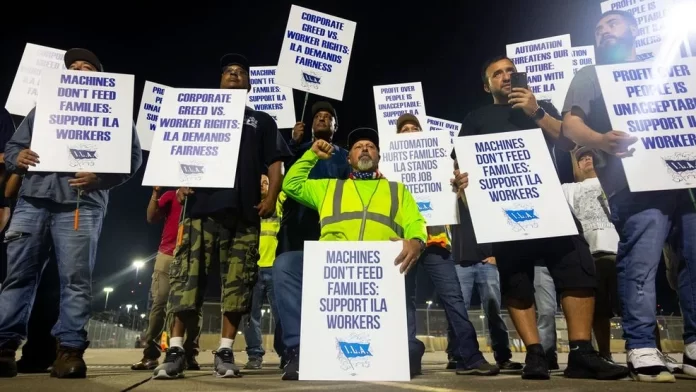Longshoremen’s Strike Disrupts Supply Chain: Potential Price Increases for Texas
As of Tuesday, nearly 50,000 members of the International Longshoremen’s Association (ILA) have gone on strike, halting operations at major ports along the East and Gulf Coasts, including those in Texas. This massive disruption is expected to have wide-reaching effects on the flow of goods and the economy, as these ports serve as critical entry points for both imports and exports. The strike not only halts the movement of goods from Maine to Texas but also threatens to disrupt U.S. exports, particularly damaging sales for American companies.
Supply Chain Disruption: How It Affects Texas
The strike comes at a critical time for the U.S. supply chain, which had only recently recovered from pandemic-related delays. Experts, such as Amir Mousavian, a professor of supply chain management, warn that the longer the strike continues, the more significant the disruptions will be. This supply chain halt could particularly affect Texans, as the Gulf Coast ports, including Houston, are essential hubs for goods entering and exiting the state. With about half of U.S. ocean imports passing through these East and Gulf Coast ports, a wide range of products are affected, including produce, cars, auto and machinery parts, clothing, pharmaceuticals, wine, toys, and seafood.
The potential for price increases on essential goods like food, clothing, car parts, and building materials is a real concern. As goods remain stranded at ports, shortages could lead to increased prices on top of inflation itself across the state, hitting consumers directly in their wallets. Any extended delays could create significant backlogs, with each day of the strike requiring between four to six days of catch-up work to return to normal operations.
How Long Will the Strike Last?
The strike stems from an impasse in labor contract negotiations between the U.S. Maritime Alliance and the ILA. While negotiations are ongoing, no resolution has been reached, leaving businesses and consumers in limbo. The longer the strike persists, the more severe the economic impacts will be, especially for states like Texas that rely heavily on Gulf Coast ports.
However, not all industries will be equally affected. Jesse B. Thompson III, a senior business economist at the Houston Branch of the Federal Reserve Bank of Dallas, noted that oil and gas exports, which are not typically transported in shipping containers, should remain relatively unaffected. On the other hand, chemical exports may face challenges, as many are shipped in containers that longshoremen handle.
Preparing for the Impact: Can Texas Businesses Weather the Storm?
Some manufacturers and retailers had the foresight to bolster their “safety stocks” in preparation for the strike. However, if the disruption continues for an extended period, these reserves may not be enough to prevent shortages. Texas businesses, especially those involved in international trade, could be hit hard as they struggle to find alternative supply routes.
The situation also presents a challenge for Texas consumers, who could see everyday items become more expensive. Higher costs on everything from groceries to clothing may strain household budgets, making it crucial for consumers to brace for possible inflationary effects.
The Bigger Picture: National and Global Economic Impact
While Texas stands to feel the brunt of the strike due to its reliance on Gulf Coast ports, the economic consequences extend far beyond the state. Nationally, a prolonged strike could hurt American companies dependent on exports, while globally, supply chains may experience further strain as shipping delays ripple through international trade networks. The strike underscores the importance of resolving labor disputes quickly to prevent long-term damage to the economy.






